|
Buddhist Spectrum
The FOUR SUBLIME States in Buddhism
Dr Senarath Tennakoon
The English equivalents for Brahma – vihara are: the four sublime
states, the four pure abodes, the four immeasurables, or the four
Stations of Brahma, respectively. These form a key set of four
meditative practices. The four are loving kindness (maitri/metta),
compassion (karuna), sympathetic joy (mudita) and equanimity (upekka)
respectively.
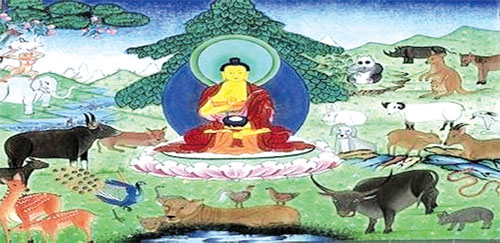
Benevolence, kindness or goodwill (maitri/metta) is the first virtue
of the four sublime states (Brahma-vihara) that every Buddhist should
cultivate towards all beings in a spirit of generosity which is free of
attachment or of thoughts of self interest (Keown, 2003). It is the
sincere thought of friendliness to all beings without any discrimination
and the wish to observe everyone to be happy and free from suffering. No
distinctions is made between friends and enemies. One who practices
lcving kindness extends it to all. Even the enemies are looked upon as
friends and wishes all to be well, happy and free from suffering. In
meditation it is first directed at oneself and then is extended towards
those close to one such as family members, relatives and friends etc.
Then it is further extended to cover all living beings.
Living beings
This type of meditation is known as Development of Loving Kindness (Metta
bhavana). This kindness has been equated to the kindness of a mother to
her only child. It is so deep and dedicated and extends far and wide to
embrace all living beings. Auto suggestion has been suggested in this
type of mental culture and this practice which leads to an ecstatic
state has a shower of advantages. (Anguttara Nikaya). Accordingly, one
sleeps peacefully, one awakens peacefully; one sees no bad dreams; one
is dear to human beings; one is dear to non human beings; one will be
protected by devas; fire, poison and weapons cannot injure one; ones
mind becomes easily concentrated; ones facial complexion will be serene;
one will die unconfused; and if one does not penetrate higher, one will
be reborn in a Brahma world (Nanaponika and Bodhi, 2007). Compassion (karuna)
is the second of the four Divine Abidings (Brahma vihara). In the
Mahayana, karuna is emphasized as the necessary complement to insight (pragna);
and insight and compassion have been compared to the two wings with
which one flies to the island of enlightenment (Keown, 2003). In
Mahayana the symbolic embodiment of compassion (karuna) is the great
Bodhisattva “Avalokitesvara” who looks down from above, having a
thousand arms extended in all directions. Compassion (karuna) is a
virtue of bestowing concern for all beings who are suffering, in trouble
and affliction.
One comes forward to help another who is suffering without caring for
the latter's identity. The victim could be any one; not necessarily
one's friend or relation. There should be no discrimination.
The Buddha tamed the great criminal Angulimala and changed him to be
a pious arahat. The Buddha advised Ambapali the famous courtesan and
transformed her into a great female devotee. These were performed by the
Buddha through great compassion.
The first item in the Buddha's daily agenda was the surveying of the
world through his great compassionate vision (maha karuna samapatti) and
He identified beings that should receive his blessings, advice and
encouragement for correcting their lives.
There was no discrimination in His selection. Even murderers,
butchers, labourers, prostitutes and demons were among them. Alavaka and
Sudiroma were fearful demons who threatened him and asked intelligent
questions. The Buddha answered their questions through sheer compassion
and made them his devotees.
The Buddha personally nursed Rev Tissa who was seriously ill when his
whole body was covered with putrid smelling boils. How the Buddha
showered His great compassion to the slave girl Punna is quite
impressive and remarkable.
The Buddha spent the rainy season in Jetavana Monastery and was
planning to visit Dakkinagiri. However, King Kosala, guild leader Anata
Pindika and Visaka, Buddha's great devotees wished and persuaded the
Buddha to stay for some more days.
Sad mood
But the Buddha was ready to go. Anatha Pindika was very sad over this
and was thinking seriously how to prevent the Buddha's departure. Anatha
Pindika's servant girl Punna noticed the sad mood and came to know of
its causation. Punna asked Anatha Pindika what could he do if she
prevented Buddha's visit. Anatha Pindika responded “I will free you from
slavery.” Immediately she ran to meet the Buddha and fell down at His
feet and begged Him to cancel the visit. She told the Buddha of the
greatest benefit that she could gain if He stopped leaving Savatthi. The
Buddha considered the plea very compassionately and realized that Punna
after being released from slavery would become an Arahant. So the Buddha
stopped His journey and abruptly turned back to Jetavana Monastery (Manoratha
purani – Sattaka Nipatha Vannana) The Buddha's mind soothing approach by
loving kindness alleviated the terribly grief stricken mind of Patachara
(who lost her husband, children and parents) and Kisagotami who lost her
only child.
Attempted murders
The Buddha's loving kindness was not limited by discrimination or
social stratification. He was sympathetic towards His father, son and
Yasodhara as well as to His stepmother. His loving kindness extended
even to Devadatta his arched enemy, who started a series of plots and
three attempted murders in order to take control of the Sanga from the
Buddha. In Buddhist meditation on compassion or development of
compassion (Karuna-bhavana), one should start the practice of extending
compassion towards one who is under some misfortune at the present
moment and then towards others who are destined to suffer from various
troubles to come, generally regarding all living beings that are subject
to decay, death and other sorts of troubles. One who has developed this
meditation is able to attain to the first ecstatic trance, (pathama-jhana),
the second ecstatic trance (dutiya-jhana) and the third ecstatic trance
(tatiya-jhana) and reap all the advantages stated under the development
of loving kindness (Anandamaitreya, 1993).
Sympathetic joy (mudita) is rejoicing in the good fortune of another.
There should be no envy at all. One should look upon the fortune of
another as one's own fortune and be joyous about it. By meditating on
sympathetic joy one's envy or jealousy is banished.
The meditator of sympathetic joy should practice it taking the
dearest person of the same sex for the first object.
Contemplating over the past prosperity of one's dearest friend, his
present prosperity, of the future prosperity awaiting him (her), the
meditator should appreciate all that at first. Next he (she) should
appreciate the prosperity of his (her) enemy, if there is. He/she should
practice loving kindness on the enemy and discard enmity. When he/she
sees the prosperity of all beings alike without any discrimination
he/she is able to attian the first, the second and the third jhanas
gradually (Anandamaitreya, 1993).
The fourth Brahma-vihara is equanimity or impartiality (upeksa/upekka).
It is with equanimity one maintains a balance or a sense of equipoise
about one's life and that of others. When this balance of mind is
disrupted through sensual attachment, emotional and other conflicts
generate causing turmoil and displeasure. It is the emotionally detached
state of one who witnesses without becoming emotionally involved.
It is a virtue and an attitude to be cultivated as opposed to simple
indifference or lack of interest (Keown, 2003). Meditation on upekka
banishes aversion. In the modern society the approach of upekka should
become extremely useful in conflict resolution at any level of social
interaction. Generally the people are egoistic and subjective and fail
to consider the objective nature of an issue at hand as they tend to
take sides in making decisions. Only a person who casts a detached view
with equanimity would be able to see both sides of an issue and solve
the conflicts. People accept legal decisions on this account. A conflict
among students could be settled amicably by an experienced teacher who
adapts the approach of uppekka.
The Buddha was a great psychologist as He understood the working of
the human mind. Further He acquired the rare ability of knowing the
minds of others (para-chitta-vijanana). King Kosala became distressed
when he came to know that his queen Mallika had given birth to a
daughter. But the Buddha consoled him and declared “Great King, some
women are great, efficient and wise. Therefore the daughter born to you
by Queen Mallika should be very well looked after. The woman who is
wise, virtuous, who treats her parents in law as deities, and is chaste
is a noble person.
Ecstatic state
The son of such a woman may even rule a country.” It is then that the
kings’ displeasure disappeared (Sarada, 1998). The development of
equanimity (Upekka-bhavana) can be easy to a person who has practiced
any one of the above three kinds of meditation. As, after the
establishment of the third ecstatic state one could extend the feeling
of equanimity towards a neutral person of the same gender at first and
reenter the first, the second and the third ecstatic states in
succession. Then one could extend equanimity towards one's dearest
companion, towards the enemy and finally towards oneself. At this stage
one would attain the fourth ecstatic state accompanied by equanimity and
one-pointedness of mind (Anandamaitreeya, 1993).
In the Rahulavada Sutta, the Buddha has advised Rahula thus: “Develop
the meditation on loving kindness, for it will banish ill-will; develop
the meditating on compassion for it will banish cruelty; develop the
meditation on sympathetic joy for it will banish jealousy and develop
meditation on equanimity for it will banish aversion; develop meditation
on impurity (asubha) for it will banish lust; develop meditation on
impermanence (anicca-sanna) for it will banish the pride of self (asmimana)
develop meditation on in and out breathing (ana pana sati), for it will
bear the fruits of mindfulness (Pemaloka, 2002). Loving kindness,
compassion, altruistic joy and equanimity if developed in such a way
will lead to the state of non returning (Nanaponika and Bodhi, 2007).
The diligent practice of the four sublime states is conducive for
individual as well as social development. Social unrest and violence are
the outcomes of conflicts caused by enmity, revenge, and jealousy etc
which are mental defilements.
These lead to social disharmony. If all practice the four sublime
states, social harmony would prevail always at all times. As such, for
harmonious social development the practice of the four sublime states is
sine qua non. It should be noted that these four sublime states are
symbolically represented by the four Bo leaves, each placed at each
corner of the National Flag of Sri Lanka.
Monk aims allegations at Buddha Sasana Ministry
G A D Sirimal
A news report (in Daily Mirror of January 4) a serious allegation has
been levelled at the Ministry of Buddha Sasana by Mahanayaka of the
Rangiri Dambulla sect of the Siamese chapter, Ven Inamaluwe Sri
Sumangala Thera where he accuses the Buddha Sasana by saying “Buddha
Sasana in Sri Lanka is facing a serious threat due to the anti-Buddhist
activities of prominent personalities entrusted with the responsibility
of protecting Buddhism. Several Buddhist monks are also among them. They
praise the President and the ministers for personal gains without any
regard to the preachings of the Buddha. Today the Buddha Sasana Ministry
is at their beck and call.
One should read this allegation against the recent resolution passed
at the 86th annual general meeting of the All Ceylon Buddhist Congress (ACBC)
where a resolution has been passed unanimously calling upon the
authorities including the Maha Sangha that a council comprising
Mahanayaka Theras of the three sects, under the banner “Sangaraja
Mandalaya” be appointed to hear cases involving the members of the
Sangha and thereby prevent the Sangha attending the normal courts of
law. Having quoted the above, it is the cry of most of the Buddhists and
also Buddhist monks, that the deterioration of Buddhism and the respect
and reverence the Buddhist monks had started with Buddhist monks taking
to politics in a great way, including entering Parliament.
As correctly stated by Ven Inamaluwe Sri Sumangala Thera, ‘They
praise the President and the ministers for personal gains without any
regard to the preachings of Buddha'.
They give priority to other work to please the government and
politicians, neglecting at least the basic needs of lay Buddhists, to
the extent refusing a request to tie a Pirith Noola, saying it is a
nuisance and disrupts other work. This humiliating experience I had at a
famous temple in my area, where the Chief monk is well known.
If this is the attitude of a monk who matters, where will Buddhism
end? At least he should have realized that a request for a Pirith Noola,
is sacred to a Buddhist at a time of distress, seeking spiritual solace.
Finally, it is not the Ministry of Buddha Sasana which should be
accused but the Sangha themselves. It is a ploy of Buddhist monks and
those so called Buddhist leaders to accuse foreign organizations when
they should look within. The governments too do not wish to impose rules
on Buddhist monks, for fear of losing votes, as Buddhist monks yet have
a say with the innocent Buddhist devotees.
Deterioration of Buddhism in this country is solely due to the
behavior of our Buddhist monks. It is apt to quote the Dhammapada Mala
Vagga – verse 6.
Ayasa va malam samutthitam – tadutthaya tam'eva khadati
Evam atidhonacarinam – sakakammani nayanti duggatin
(As rust sprung from iron eats itself away when arisen, even so
his own deeds lead the transgressor to state of woe)
Dehiwala YMBA activities
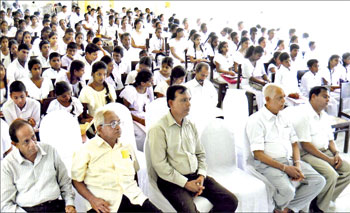 The Young Men's Buddhist Association of Dehiwala-Mt. Lavinia hosted a
seminar which was a big success with about 200 students participating.
While all teachers and students who participated were presented with
uniforms, lunch was provided to all from the personal contribution of
the President of the Association. The Young Men's Buddhist Association of Dehiwala-Mt. Lavinia hosted a
seminar which was a big success with about 200 students participating.
While all teachers and students who participated were presented with
uniforms, lunch was provided to all from the personal contribution of
the President of the Association.
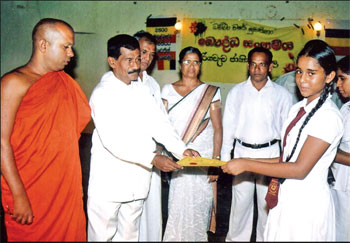
Along with the seminar, a new project too was launched for awarding
Scholarships to needy students of the Dehiwala-Mt. Lavinia Daham Pasals
who pass the G.C.E. (O/L) with merit, but lack of economic means to
continue with further higher studies thereafter.
A brochure on the proposed scheme was presented to the Chief Guest on
this occasion, the Most Venerable Kotugoda Dhammawasa Thera, the
President of the Amarapura Sangha Sabha.
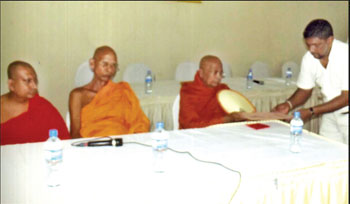
On the same occasion, school uniforms, shoes and socks were handed
over to the Principal of the Waisaka Balika Vidyalaya, Wellawatta, to be
distributed among the needy students of the said school with financial
difficulties.
The Most Ven. Kotugoda Dhammawasa Thera – President of the Amarapura
Sangha Sabha, Sasthrapathi Panditha Ven.
Ambewela Dhammapala Thera – Chief Incumbent of the Sashrananda
Pirivena and Shasthrapathi Ven.
Hegoda Vipassi Thera of the Dharma Paryeshana Ayathanaya, Deshapriya
Gunasinghe – Senior Lecturer and K.D.P. Anuruddha of the Presidential
Media Unit were among the speakers who addressed the seminar.
Author receives accolades
H L Sunil Shantha - Kalutara Correspondent
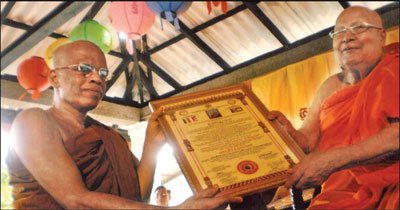 The Chief Incumbent of Purana Sath Budu Viharaya, Moronthuduwa,
Kalutara Ven Paragasthota Sudhamma Thera received the accolade
“Pravachana Keerthi Sri Shasana Vibhushana” offered by the ‘Srimath
Anagarika Dharmapala Humanitarian Foundation’ at the “Swarna Bimba
Upahara Sammana Ulela” (Swarna Bimba Felicitation Ceremony) held at Sri
Pushparama Maha Viharaya, Maleygoda, Payagala, Kalutara with the
participation of more than hundred Accolade deserving personnel, from
all parts of the island, recently. The Chief Incumbent of Purana Sath Budu Viharaya, Moronthuduwa,
Kalutara Ven Paragasthota Sudhamma Thera received the accolade
“Pravachana Keerthi Sri Shasana Vibhushana” offered by the ‘Srimath
Anagarika Dharmapala Humanitarian Foundation’ at the “Swarna Bimba
Upahara Sammana Ulela” (Swarna Bimba Felicitation Ceremony) held at Sri
Pushparama Maha Viharaya, Maleygoda, Payagala, Kalutara with the
participation of more than hundred Accolade deserving personnel, from
all parts of the island, recently.
The Chief Guest was the most Ven. Ambewela Sri Pagnasara Maha Nayaka
Thera of Uva Chapter of the Siyam Maha Nikaya.
Ven Paragasthota Sudhamma Thera has written quite a number of
Buddhism books and booklets based on the teaching of the Lord Buddha and
His Discourse in simple Sinhala Language for the benefit of the general
public and schoolchildren. He has constructed several Buddhist Temples,
hermitages, and several meditation centers at Kodigalakande and in the
Kalutara district for the use of Buddhist pilgrims. The Thera has served
as the Chief Parivenadhipathi of several Pirivenas in the Kalutara
district. He, at the moment, serves as the Chief Patron for many
Buddhist organizations and civil organizations in the district. He holds
many accolades such as, “Kammattana Visharadha”, “Dharma Keerthi Sri
Medhanandha”, “Saddharma Keerthi Sri Literary Pundit” as well.
The Thera was awarded the “Pravachana Keerthi Sri Shasana Vibhushana”
by the Anagarika Dharmapala Foundation in honour of the great service
performed by him for the benefit of Buddha Shasana and the general
public.
|
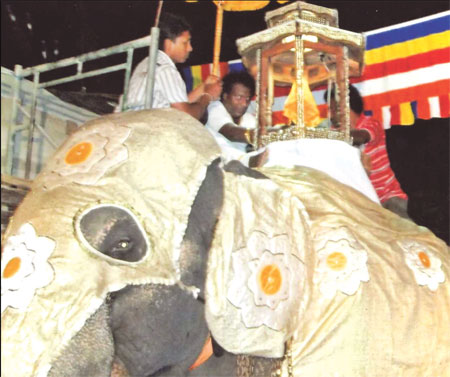
The 16th Annual Kap Situwime Maha Perahera of the
Gonawala-Thalwatta Gambhara
Devalaya was held recently. The Head of the Devalaya
Priyadharshana Kariyapperuma
places the casket of relics on the lead elephant. (Malwana
group correspondent – Mahanama Vithanage) |
|







